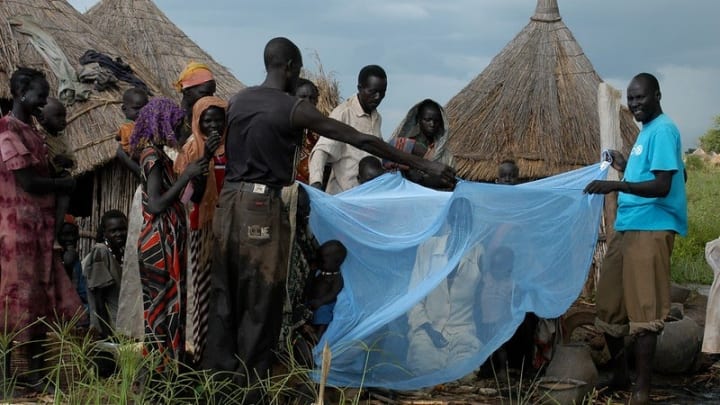
A year ago, as the first COVID-19 diagnoses were confirmed around the world, governments began to look back at history for guidance on how to prepare for what lay ahead. For African leaders, the threat was familiar. The continent copes daily with societal and economic disruption caused by infectious diseases, which have returned to plague both lower-income and richer nations in the past year.
The COVID-19 pandemic has placed incredible additional strain on health systems across Africa. Countries must work to maintain routine health services, even as they try to manage the added burdens. We are inspired by the response to COVID-19. Communities have adopted new behaviors to protect themselves, wearing masks and observing social distancing. Governments and businesses continue to work together at unprecedented speed to produce vaccines that promise to rid the world of COVID-19.
So, while it is urgent that Africa benefits equitably from the latest advances in treating and preventing COVID-19, we must also ensure our underlying health systems are strengthened to combat the many other infectious diseases that currently attract less attention, but not fewer fatalities or less strain on health systems.
Last year’s “World Malaria Report” gave a dire warning. Even before the pandemic, despite gains in many countries since the turn of the century, progress on eliminating malaria had stalled and, in some cases, even reversed. While we saw a small reduction in global malaria deaths in 2019, there was an increase in cases, which reached nearly 230 million. Africa was home to 94% of these malaria cases and deaths, with pregnant women and children under 5 continuing to bear the brunt of the disease.
We need the same ingenuity, commitment, and political prioritization [that COVID-19 saw] to ensure it isn’t long before we can also look to a post-malaria world.
—
Alarmed by the resurgence of malaria, African leaders launched the Zero Malaria Starts With Me campaign. Now rolled out in over a dozen countries in Africa, the movement seeks to strengthen local, national, and regional efforts to spur action, resource mobilization, and accountability toward a malaria-free Africa.
Unlike COVID-19, malaria is easily treatable and preventable. If we can muster even a fraction of the effort COVID-19 has rightly inspired, we can rapidly accelerate progress to save lives and livelihoods at a time when the African economy urgently needs a social and economic boost. Evidence suggests that investments in the fight against malaria can in turn strengthen health system preparedness and help protect against the next pandemic.
That is why our countries prioritized sustaining malaria interventions during the pandemic. When the World Health Organization warned in April that COVID-19 could lead to a doubling of malaria deaths, governments across Africa responded quickly, prioritizing insecticide-treated net campaigns and working to sustain case management. This included devolving treatment of malaria from health facilities to community health workers.
Front-line community health workers are the backbone of any country’s health system and essential to tackling malaria, improving health outcomes, and preparing us for the next pandemic. The most recent outbreaks of Ebola in the Democratic Republic of the Congo and Guinea show there can be no complacency, and we must be able to manage multiple epidemiological challenges.
Get development’s most important headlines in your inbox every day.
Thanks for subscribing!
A disease threat anywhere is a disease threat everywhere. Therefore, we urgently need a global plan to boost the health care workforce, beginning with the community health workers who form our first line of defense against disease.
If we are to successfully manage endemic diseases such as malaria, empowered communities must be at the heart of our efforts. In Sierra Leone, where memories of the devastating impact of the 2014 Ebola crisis are still fresh, Comic Relief and GlaxoSmithKline have been supporting community-based journalists to uncover local stories about the impact of malaria and COVID-19. The reporters are dispelling myths, ensuring people seek the treatment they need, and holding the local government to account.
In Brief: Predicted doubling of malaria deaths in Africa averted
WHO predicted that malaria deaths in Africa could double if access to malaria prevention programs and treatments was severely interrupted. But these deaths were averted as malaria programming went forward as planned.
COVID-19 has also shown us that without strong surveillance systems and accurate data, we’re shooting in the dark. Governments need to invest in bolstering surveillance and health information management systems that can inform public health policy decisions. Tanzania has developed a mobile phone application that allows health officials and parliamentarians to track public health data in real time, improving the speed and accuracy of decision-making, with support from the African Leaders Malaria Alliance.
The coming months will rightly see huge efforts to ensure African nations gain equitable benefits from the remarkable progress being made in the fight against COVID-19. Access to vaccines will be at the top of the agendas at the upcoming World Health Assembly, the summit of the G-7 group of nations, the G-20 Global Health Summit, and the Commonwealth Heads of Government Meeting.
Our leaders must make equal effort — both domestically and in their talks with international partners — to invest in Africa’s health systems. This includes grassroots primary health care and data and surveillance systems, so that we are better prepared for the next pandemic and ongoing endemic diseases such as malaria are no longer an impediment to the continent’s development.
A year on from COVID-19’s emergence, we are looking forward to a post-COVID-19 world. We need the same ingenuity, commitment, and political prioritization to ensure it isn’t long before we can also look to a post-malaria world. Zero malaria starts with each and all of us.
Printing articles to share with others is a breach of our terms and conditions and copyright policy. Please use the sharing options on the left side of the article. Devex Pro subscribers may share up to 10 articles per month using the Pro share tool ( ).
from WordPress https://ift.tt/3sN2Ytr
via IFTTT

No comments:
Post a Comment